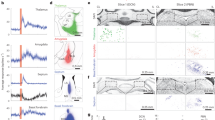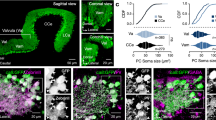Abstract
None of the brain peptides has been demonstrated to be present in significant amounts in the cerebellum1,2. The only effector substance known in the Purkinje cell, whose axon carries the integrated output of the cerebellar cortex, is the decarboxylated residue of glutamic acid3–6. An antiserum raised against synthetic porcine gut motilin and directed at the midportion and carboxyl end of the 22-amino acid polypeptide7 shows, in anatomically intact rat, mouse and human cerebellum, that most Purkinje cells contain motilin or a closely related substance8. We report here that motilin-absorbable immunoreactivity is evident from the spines of tertiary dendrites, through the cell body and axon, to nerve endings terminating, as expected, in the deep cerebellar nuclei and, unexpectedly, on nerve cells of some brain stem nuclei. In addition to its obvious functional implications, motilin is thus an important marker with which to re-examine the organization and projections of Purkinje cells, their ontogeny and their response to injury.
This is a preview of subscription content, access via your institution
Access options
Subscribe to this journal
Receive 51 print issues and online access
$199.00 per year
only $3.90 per issue
Buy this article
- Purchase on Springer Link
- Instant access to full article PDF
Prices may be subject to local taxes which are calculated during checkout
Similar content being viewed by others
References
Zetler, G. Adv. biochem. Psychopharmac. 18, 1–21 (1978).
Hökfelt, T., Joohansson, O., Lungdahl, A. & Schultzberg, M. Nature 284, 515–521 (1980).
Barber, R. & Saito, K. in GABA in Nervous System Function (eds Roberts, E. Chase, T. N. & Tower, D. B.) 113–132 (Raven, New York, 1976).
Chan-Palay, V. Cerebellar Dentate Nucleus, Organization, Cytology and Transmitters (Springer, Berlin, 1977).
Chan-Palay, V. Proc. natn. Acad. Sci. U.S.A. 75, 1024–1028 (1978).
Chan-Palay, V., Wu, J.-Y. & Palay, S. L. Proc. natn. Acad. Sci. U.S.A. 76, 2067–2071 (1979).
O'Donohue, T. L. et al. Peptides (in the press).
Nilaver, G., Defendini, R., Zimmerman, E. A., Beinfeld, M. C. & O'Donohue, T. L. Soc. Neurosci. 7, 99 (1981).
Nilaver, G. et al. J. Cell Biol. 81, 50–58 (1979).
Avrameas, S. & Ternynck, T. Immunochemistry 6, 53 (1969).
Vaitukaitis, J. L., Ross, G. T., Pierce, J. G., Cornell, J. S. & Reichert, L. E. J. clin. Endocr. Metab. 37, 653–659 (1973).
Sternberger, L. A. Immunocytochemistry (Prentice-Hall, New Jersey, 1974).
Sato, N. & Cargille, C. M. Endocrinology 90, 302–306 (1976).
Voogd, V. in Neurobiology of Cerebellar Evolution and Development (ed. Llinas, R.) 493–514 (AMA–ERF Institute for Biomedical Research, Chicago, 1969).
Phillis, J. W. & Kirkpatrick, J. R. Eur. J. Pharmac. 58, 469–472 (1979).
Author information
Authors and Affiliations
Rights and permissions
About this article
Cite this article
Nilaver, G., Defendini, R., Zimmerman, E. et al. Motilin in the Purkinje cell of the cerebellum. Nature 295, 597–598 (1982). https://doi.org/10.1038/295597a0
Received:
Accepted:
Issue Date:
DOI: https://doi.org/10.1038/295597a0
This article is cited by
-
Central, but not peripheral application of motilin increases c-Fos expression in hypothalamic nuclei in the rat brain
Histochemistry and Cell Biology (2005)
-
Slow transit chronic constipation (Arbuthnot Lane's disease)
International Journal of Colorectal Disease (1990)
-
Somatostatin expression in the cerebellar cortex during postnatal development
Anatomy and Embryology (1989)
-
Neuro-toxic interaction in alcohol-treated, thiamine-deficient mice
Acta Neuropathologica (1987)
-
Monoclonal antibodies against human T lymphocytes label Purkinje neurones of many species
Nature (1982)
Comments
By submitting a comment you agree to abide by our Terms and Community Guidelines. If you find something abusive or that does not comply with our terms or guidelines please flag it as inappropriate.



